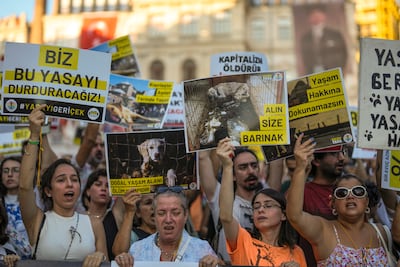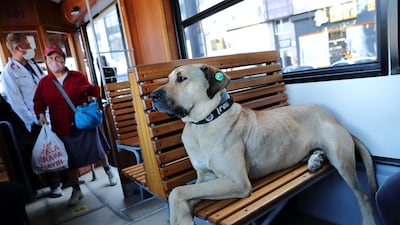Turkish politicians have passed legislation that will allow authorities to round up the country’s street dogs, a move that has pitted proponents and opponents of the law against each other.
MPs passed amendments to the country's animal protection law after marathon debates in Parliament at the weekend. The changes were passed with 275 politicians voting in favour to 224 against.
The amendments, proposed by President Recep Tayyip Erdogan’s ruling Justice and Development Party (AKP), state that stray dogs must be rounded up, neutered, vaccinated and placed in shelters for adoption.
The law is necessary to deal with the country’s “stray dog problem,” the President said. It does not target Turkey's large stray cat population.
Turkey has more than four million stray dogs, the government estimates. While many are docile, some gather in packs and have attacked humans.
The most controversial part of the law allows municipalities to put to sleep dogs that "pose a danger to the life and health of humans and animals, and whose negative behaviour cannot be controlled, who have an infectious or incurable disease, or are prohibited from adoption".

Senem Demirel, a lawyer and animal rights activist, said although a previous proposal to euthanise all street dogs put into shelters after 30 days had been scrapped, the latest provisions passed will allow for mass euthanasia of dogs anyway.
"The same practice will continue," Ms Demirel said.
Poor conditions in overcrowded shelters will also lead to deaths from disease, warned animal rights activists who have gathered in large groups to protest against the changes across Turkey in recent weeks.
"Shelters have never been in good condition," said Hulya Yalcin, president of the Animal Justice Association. "They have always been associated with death, torture, hunger, disease and mistreatment, and they still are."
As an alternative, animal rights activists have proposed the government and municipalities better implement existing legislation that requires municipalities to tag, neuter and vaccinate all stray dogs, before releasing them.
"The number [of dogs] has increased excessively due to municipalities that do not work and are not prosecuted for their responsibilities despite not working," said Ms Yalcin. "With sterilisation, the population will definitely be brought under control and kept under control in two or three years. After all, there is no country that has found a solution by killing."
Municipalities run by the opposition Republican People's Party (CHP) say they will not implement the new rules, although the law allows for prison sentences of up to two years for mayors who refuse to do so. The CHP has said it will challenge the legislation in Turkey's Supreme Court.
president of Turkey's Animal Justice Association
Murat Pinar, who supported the stray dogs law, is head of the Safe Streets Association, which he set up after his daughter Mahra, 9, was hit by a lorry and killed while fleeing from a pack of dogs.
He dismissed opposition politicians and activists' behaviour as "provocative".
"There is no provision that orders the killing of dogs," he said. "What really matters is that all dogs be adopted. We want a regulation that will not leave even a single unattended dog on the streets."
He also played down calls by some international animal rights activists for a tourist boycott of Turkey over the stray dog legislation.
"Our beaches and facilities will never lose their appeal to foreign tourists because we are unrivalled in every sense," Mr Pinar said.


